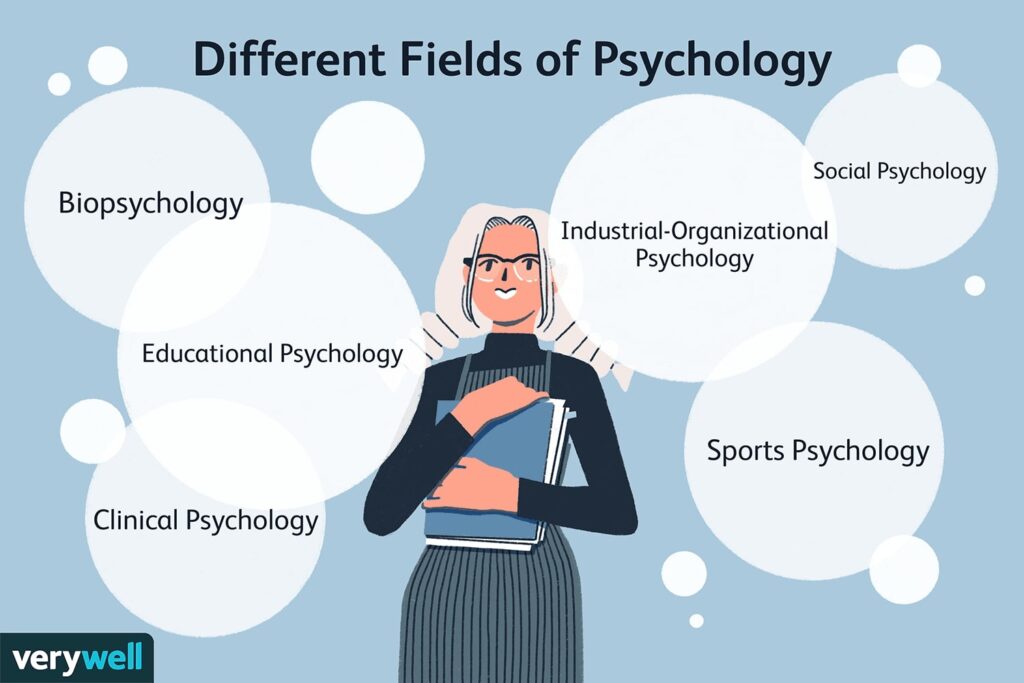What is Psychology?
Ah, psychology—the intriguing study of the mind and behaviour. But what does that really mean? Let’s unpack this a bit, shall we?
The Basics: A Scientific Endeavour
Psychology is a scientific study, which means it relies on systematic methods for observing, understanding, and interpreting human behaviour. This isn’t akin to mystical mind-reading; it’s about using research and data to figure out how and why we think, feel, and act the way we do.
The Four Pillars
Psychology operates on four main goals:
- Describe: This involves painting an accurate picture of behavioural and mental processes. Imagine you’re a sportscaster, detailing the moves in a football match. Similarly, psychologists describe how different emotions manifest or how stress affects behaviour.
- Explain: Why did the player make that move? Similarly, psychologists aim to explain the ‘why’ behind our actions and thoughts. This could be as complex as why we fall in love with a certain type of person, or as simple as why we prefer tea over coffee.
- Predict: Knowing how things work and why they happen enables psychologists to make educated guesses about future behaviour. It’s not psychic prediction; it’s based on data and trends.
- Control: The ultimate goal is to improve lives by managing or altering detrimental behaviours or thought patterns. It’s like tweaking the settings on your Mac to make it run faster, but in this case, the aim might be to develop strategies to manage stress or enhance learning.
Practical Implications
Psychology can help in real-world scenarios too. For instance, understanding cognitive biases can make you a more informed voter or consumer. Moreover, grasping psychological principles can elevate your interpersonal skills, be it in friendships, familial relationships, or the workplace.
Why It Matters
Understanding psychology doesn’t just make you sound smarter at dinner parties; it offers you tools for real life. From helping you understand why you procrastinate to giving you the insights to improve your well-being, the applications are endless.
Fields of Psychology

So, you’ve got a grip on what psychology is all about. Great! But did you know that psychology is not a monolith? Imagine it as a bustling city with various neighbourhoods, each with its own unique character and charm. Let’s explore some of these fascinating “neighbourhoods,” shall we?
Clinical Psychology
What’s It About?
When people think of psychology, they often think of therapy and mental health, and that’s where clinical psychology comes in. Clinical psychologists diagnose and treat mental, emotional, and behavioural disorders. They’re the experts you turn to when you’re dealing with stress, depression, or anxiety.
Real-world Application
Imagine you’re feeling persistently sad or anxious. A clinical psychologist could help you identify the underlying issues and equip you with coping mechanisms, much like a GP diagnoses a physical ailment and prescribes medication.
Cognitive Psychology
What’s It About?
Cognitive psychology is all about mental processes such as attention, language use, perception, problem-solving, and memory. Basically, it’s the study of how we think and learn.
Real-world Application
Ever wondered how to improve your memory when studying for exams? Cognitive psychologists research techniques to enhance memory and problem-solving, helping you ace that difficult test.
Biological Psychology
What’s It About?
This field focuses on the relationship between psychological processes and the body’s physical structure, particularly the brain. They explore how hormones, neurotransmitters, and other biological factors affect our behaviour and emotions.
Real-world Application
Understanding biological psychology can explain the rush you feel while playing sports or watching a thrilling film—thanks to adrenaline and other hormones.
Social Psychology
What’s It About?
This is the study of how society influences individual behaviour and thought processes. Ever wondered why you behave differently in a crowd or why social norms exist? Social psychologists are the ones asking these questions.
Real-world Application
Insights from social psychology can help in everything from executing more effective advertising campaigns to understanding how to reduce prejudice and discrimination in society.
Developmental Psychology
What’s It About?
Developmental psychologists study how people grow and adapt at different life stages. From understanding childhood development to cognitive decline in old age, this field offers valuable insights into the human lifespan.
Real-world Application
This can help educators tailor curricula to different age groups, or aid parents in understanding typical behaviours at various developmental stages.
Other Exciting Areas
There are more specialities like forensic psychology, which combines law and psychology, and industrial/organisational psychology, focusing on workplace dynamics. The list is long and diverse, offering something for almost everyone’s interests.
Why Does It Matter?
Different fields of psychology not only enrich our general understanding of the human mind and behaviour but also have real-world applications that can improve our lives in tangible ways.
Ready to explore more about these intriguing fields? The journey into the human mind never ceases to amaze!
Research Methods in Psychology
Ah, research methods—the backbone of psychology. While the fields of psychology are the “what” and “why,” research methods are the “how.” They’re the tools psychologists use to dig into the human mind and behaviour. Think of them as the Sherlock Holmes-style detective kits of psychology. Let’s investigate some of these key methodologies, shall we?
Experiments: The Controlled Probes
What’s It About?
An experiment is a controlled test of a hypothesis—basically, a “what if” question you want to answer. Psychologists manipulate one or more variables and measure how this affects other variables.
Real-world Application
Suppose you’re interested in whether listening to classical music while studying improves exam performance. You’d play Mozart for one group while they study and leave another group in silence. Then, you’d compare their test scores to see if the music had any effect.
Surveys: The Question Masters
What’s It About?
Surveys involve asking people a series of questions to gather data on attitudes, beliefs, or behaviours. These can be administered through interviews, questionnaires, or online forms.
Real-world Application
Ever filled out a customer satisfaction survey for a retail store? That’s a basic example of a survey method. Psychologists might use a more intricate survey to understand public opinion on mental health issues, for instance.
Observations: The Silent Watchers
What’s It About?
This involves observing subjects in a natural or controlled setting. The key here is not to interact with the subjects to keep the data pure.
Real-world Application
Want to know how children interact in a playground when they think no one is watching? Observational methods can provide insights into natural behaviours in such settings.
Case Studies: The Deep Dives
What’s It About?
A case study is an in-depth examination of a single individual or a small group. This is often used for rare or unique circumstances that can’t be replicated in an experiment.
Real-world Application
Remember the story of Phineas Gage, the railroad worker who survived a severe brain injury? His case provided invaluable insights into brain function and personality change.
Correlational Studies: The Relationship Analysts
What’s It About?
These studies look at the relationships between two or more variables, but without manipulating them. It’s like noticing that people tend to buy more ice cream when it’s hot out, but not actively changing the weather to test ice cream sales.
Real-world Application
For example, correlational studies may look at the relationship between exercise frequency and mental well-being, providing us insights into lifestyle choices and mental health.
Ethical Considerations in Psychology Research
Ethical considerations in psychology are like the traffic lights and road signs of scientific inquiry—they guide researchers in conducting studies responsibly and safely. Because psychology often delves into the depths of human experience, it’s essential that research is conducted in an ethical manner to protect participants from harm. Let’s delve into the key ethical principles that form the bedrock of psychological research.
Informed Consent
What’s It About?
Informed consent means that participants voluntarily agree to take part in a study, fully understanding the nature of the research and any potential risks involved. In essence, they give the “green light” to go ahead.
Real-world Application
Before participating in a study on stress management techniques, you’d be given an information sheet outlining the study’s goals, what you’ll be doing, and any potential risks. You must read and agree to these terms before the research begins.
Confidentiality
What’s It About?
All the information collected during a study must be kept confidential. Think of it as storing the data in an iron vault that only approved individuals can access.
Real-world Application
If you participate in a study about personal habits, your identity would be kept anonymous or pseudonymous, ensuring your personal details don’t leak out and tarnish your reputation.
Right to Withdraw
What’s It About?
Participants must be free to withdraw from a study at any time without any negative consequences. Think of it as an emergency exit—you can leave whenever you want.
Real-world Application
If you’re in a study on anxiety and find that the tasks are making you unduly uncomfortable, you should be able to leave the study immediately without any repercussions.
Deception
What’s It About?
Sometimes, researchers need to deceive participants to ensure the study’s validity. However, any deception must be justified and cannot cause harm.
Real-world Application
You might be told that a study is about memory when it’s actually about stress responses. After the study concludes, the researchers must “debrief” you, revealing the true purpose and ensuring no harm was done.
Debriefing
What’s It About?
At the end of a study, participants should be debriefed. This involves explaining the study’s purpose and methods, and making sure the participant leaves in a state of well-being.
Real-world Application
After a study on emotional responses, you would be briefed on what the study actually involved and its goals. If the study evoked any strong emotional responses, resources for emotional support would be provided.
History and Important Figures in Psychology
Psychology might feel like a modern endeavour, but its roots stretch back far into history. Just as technology evolved, psychology has undergone its own journey of evolution. Let’s travel back in time and meet some of the trailblasers who helped shape the discipline.
Early Foundations – Philosophical Meanderings
What’s It About?
Long before psychology was a formal science, philosophers like Socrates, Plato, and Aristotle pondered questions related to the mind, perception, and human nature.
Real-world Application
These early musings laid the groundwork for understanding human cognition and behaviour, which in turn, influenced how later psychologists approached their research.
Wilhelm Wundt – The Birth of Modern Psychology
What’s It About?
Wundt, often dubbed the “father of psychology,” established the first psychology laboratory in Leipzig, Germany, in 1879. This marked psychology’s transition from a philosophical inquiry to a scientific discipline.
Real-world Application
Wundt’s methods for studying human consciousness laid the foundation for experimental psychology, setting the standard for how psychological research would be conducted.
Sigmund Freud – The Mind’s Basement
What’s It About?
Freud is famous—or infamous, depending on your viewpoint—for his theories on the unconscious mind and psychoanalysis. He believed that many of our actions stem from unconscious desires and experiences.
Real-world Application
While many of Freud’s theories are controversial, his work laid the groundwork for psychotherapy and the treatment of mental health disorders.
John Watson and B.F. Skinner – The Behaviourists
What’s It About?
Watson and Skinner focused on observable behaviour, essentially asking, “Why ponder the complexities of the mind when we can just look at what people do?”
Real-world Application
Behaviourism has been especially influential in educational settings and therapy, particularly in techniques for modifying problematic behaviours.
Carl Rogers and Abraham Maslow – The Humanists
What’s It About?
Humanistic psychologists like Rogers and Maslow emphasised personal growth, self-actualisation, and the importance of free will.
Real-world Application
Humanistic psychology laid the foundation for many approaches to mental health care, including client-centred therapy and the concept of self-care.
Jean Piaget – The Child Whisperer
What’s It About?
Piaget’s work revolutionised our understanding of child development, particularly in the realm of cognitive growth and learning.
Real-world Application
His theories have greatly influenced educational psychology, providing a framework for age-appropriate teaching methods.










